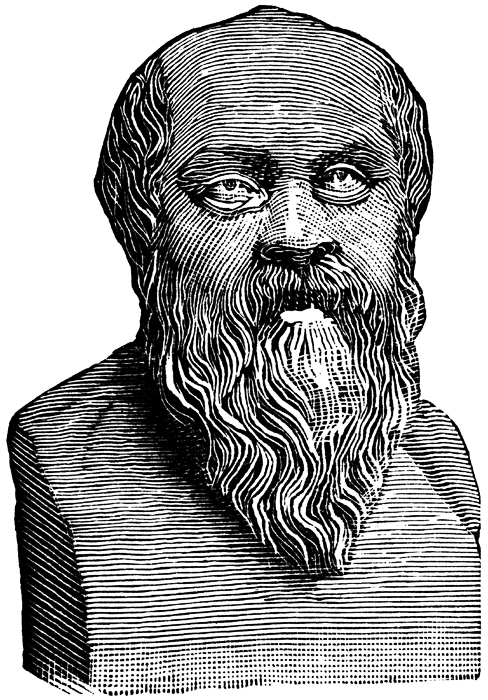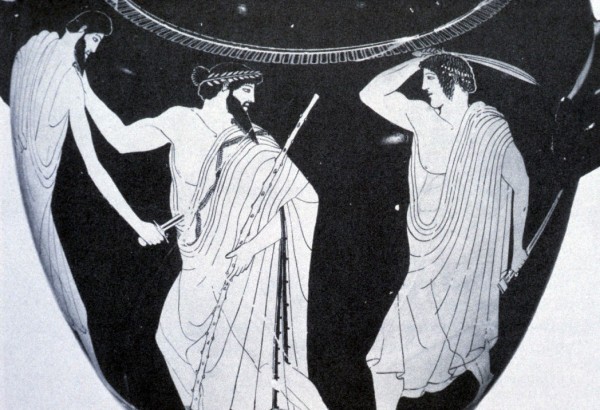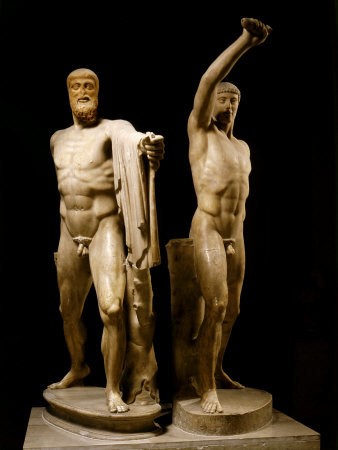Do you remember a few weeks ago when we had a bit of a discussion on the Platonic dialogue, Gorgias? I sure do. Those were good times, simpler times.
Most of you are dedicated readers so I won’t have

to remind you that we discussed the nature of rhetoric, the morality of rhetoric, and Socrates’ assertion that, without philosophy, rhetoric is merely a form of flattery, a way to entice people to accept a position that is often unjust.
Then again, a lot of you are reading this newsletter for the first time. So for those of you who are just joining the party, I would like to invite you to come on in, man, shut the door, the bar is in the back.
Okay! Let’s get to it.
So we were talking about Gorgias, right? Well, as it turns out, we stopped right before we got to some serious philosophical musings. It is the sort of ancient philosophy that most people take for granted but can, in fact, shed some light on the way we perceive our world today.
Basically, it’s my bread and butter.

Anyway, when we last left Socrates he had just finished up a discussion with the dialogue’s namesake, Gorgias, and had made the assertion that rhetoric, without philosophy, was something of a vice.
The implication of this is that speechmakers like Gorgias, not to mention politicians and sophists, have the tendency to become good-for-nothing dogs who couldn’t care less for true understanding or justice.
Well, this struck a nerve with Polus, another participant in the dialogue, and he begins something of a crusade against the Father of Western Philosophy.
“And do even you, Socrates, seriously believe what you are now saying about rhetoric? What! because Gorgias was ashamed to deny that the rhetorician knew the just and the honourable and the good, and admitted that to any one who came to him ignorant of them he could teach them, and then out of this admission there arose a contradiction-the thing which you dearly love, and to which not he, but you, brought the argument by your captious questions. Do you seriously believe that there is any truth in all this?” -Polus (Gorgias)
Polus argues that rhetoricians possess great power within a city. A good rhetorician might persuade a court to confiscate the property of a man or to exile a criminal from a state. In this way it would seem they are like tyrants and possess great power.
Well, it’s funny you should mention tyrants, says Socrates, because those bums are just as bad as the rhetoricians. In fact, tyrants and rhetoricians possess no real power at all and are really the most pitiful people in all of society.
“And I tell you, Polus, that rhetoricians and tyrants have the least possible power in states, as I was just now saying; for they do literally nothing which they will, but only what they think best.” -Socrates (Gorgias)
What?! Socrates must have been to too many symposiums because he is talking absolute nonsense. Polus certainly thinks this is the case. At one point he even laughs a Socrates for proposing such a foolish idea.
Polus gives the example of a real-life king who unjustly murders his brother and seizes his throne. This man will, presumably, live the rest of his life in luxury, endowed with the ability to take anything he pleases.

Certainly, Polus argues, this king is truly happy and should be envied. However, Socrates is sticking to his guns on this one. This man should not be envied. He is actually miserable and deserves only our pity.
In order for Socrates’ argument to stand any sort of chance, he will have to prove that tyrants, the men who kill and exile and condemn, only do what they think is best and not what is truly best. To do this, Socrates makes the second claim that it is a far better thing to suffer injustice than to commit injustice.
“Then I said truly, Polus that neither you, nor I, nor any man, would rather, do than suffer injustice; for to do injustice is the greater evil of the two.” -Socrates (Gorgias)
Socrates asks Polus to tell him if it is worse to suffer injustice or to commit injustice. Polus claims that it is worse to suffer injustice.
Socrates then asks which is more disgraceful. Polus concedes that committing injustice is more disgraceful.
The philosopher pushes on and claims that when comparing the goodness of a thing, we ought to consider it’s utility and pleasure.
“Let me ask a question of you: When you speak of beautiful things,such as bodies, colours, figures, sounds, institutions, do you not call them beautiful in reference to some standard: bodies, for example, are beautiful in proportion as they are useful, or as the sight of them gives pleasure to the spectators; can you give any other account of personal beauty?” -Socrates (Gorgias)
Conversely, we should consider if things are evil by examining the amount of pain and disgrace within an activity.
When considering committing injustice or suffering injustice, Polus concedes that committing injustice can be painful, but suffering is far more painful. However, when it comes to disgrace, committing injustice is truly disgraceful while suffering injustice is not disgraceful at all.
And so we must conclude that committing injustice is painful and disgraceful while suffering injustice is merely painful. Therefore, committing injustice is the greater evil. And would any reasonable man ever wish to pursue that which is most evil and bad?
Certainly not.
This is where we come back to the claim that tyrants do only what they think is best and not what is truly best. Therefore, they should be pitied.
Now, some of you might be scratching your head over this one. It would seem like Socrates won his point because of a technicality. When comparing an unjust king to and just prisoner who is, oh let’s just say, having his skin peeled from his bones, we might be hesitant to say that the latter is happier than the former.
Polus actually raises such an objection.
“If a man is detected in an unjust attempt to make himself a tyrant, and when detected is racked, mutilated, has his eyes burned out, and after having had all sorts of great injuries inflicted on him, and having seen his wife and children suffer the like, is at last impaled or tarred and burned alive, will he be happier than if he escape and become a tyrant, and continue all through life doing what he likes and holding the reins of government, the envy and admiration both of citizens and strangers?”-Polus (Gorgias)
Well, when you put it like that…
Socrates’ argument that tyrants are pitiable certainly might come under fire. It might seem absurd to suggest that we would truly be happier suffering injustice rather than reaping the spoils of committing injustice.
We must remember that at the heart of this argument there is the Platonic idea that there exists the form of Goodness (with a capitol G). We can only live a happy, fulfilled life by actively pursuing and understanding the Good.
By behaving unjustly as if we were tyrants, we are actually damaging our true self, our inner self. Tyrants are pitiable because they possess a tarnished soul, an incomplete existence.
The bottom line is that it is a far better thing to suffer whilst in pursuit of truth than to live ignobly in the shade of ignorance and injustice. And if there ever was a purely Socratic idea, it is this sentiment exactly.
Nowadays we don’t have tyrants, per say, but we still have politicians. Plato had a few things to say about them as well, namely that democratic government tends to create a bunch of corrupt, self-interested tyrants who care nothing for the people, but we will get to that another day.
If we do choose to accept Socrates’ argument for the pitiable tyrant, then we might view our modern-day tyrants in a new light. The next time you read about a massive corruption scandal in the newspaper or see an elected representative lying through their teeth on the television, you simply need to shake your head and say…
Those poor, miserable bastards.
 to remind you that we discussed the nature of rhetoric, the morality of rhetoric, and Socrates’ assertion that, without philosophy, rhetoric is merely a form of flattery, a way to entice people to accept a position that is often unjust.
to remind you that we discussed the nature of rhetoric, the morality of rhetoric, and Socrates’ assertion that, without philosophy, rhetoric is merely a form of flattery, a way to entice people to accept a position that is often unjust.











No comments yet. You should be kind and add one!
Our apologies, you must be logged in to post a comment.